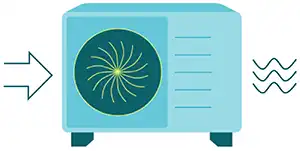A Beginners’ Guide to Off Grid Living
From portable tiny homes to larger countryside properties, there are several types of off-grid homes in the UK. With cities becoming more crowded, many people turn to rural locations to find peace and spend more time in nature.
This lifestyle can be hugely rewarding, but the nature of a more rural life means that switching from on-grid to off-grid living requires some adjustments. Whether you’re relocating to a village or transitioning to a more remote, sustainable lifestyle, this guide is for you. Discover everything you need to know about living off the National Grid.
Our guide to living off the grid for beginners
Start with research
Many people turn to a rural life to lead a simpler life. However, there are certainly lifestyle changes to consider. For example, you may have reduced access to shops due to longer distances or you may experience more disruption from adverse weather. Educating yourself about all aspects of this lifestyle will help you to understand if it’s the right decision for you.
Before you make the move, we recommend that you gather as much information as possible about off-grid living. Research is particularly important for those looking to adopt a more remote lifestyle. Read books, watch videos, and connect with online communities (like a Facebook group!) to learn from experienced off-gridders.
An off grid setup for beginners: What to consider?
Self-sufficiency is one of the most desirable benefits of living off the grid. But, what do you need to consider to become self-sufficient?
Energy generation
Off-grid homes are not connected to the National Grid, which delivers gas and electricity for the majority of UK households. Instead, off-grid houses rely on heating oil or electric heating. Using heating oil in the home can be quite a different experience if you’re used to gas. It’s not available ‘on tap’ and therefore requires more planning ahead.
Here, at Certas Energy, we offer ways to help you manage your heating oil consumption. With PLANNED Pay Monthly, we will automatically arrange your heating oil deliveries. This payment plan ensures that you don’t have to worry about running out of fuel. You can also invest in the easy-to-use FoxRadar oil level monitor to keep a close eye on your usage.
If you’re new to using oil heating, read our house buyer’s guide to heating oil.
However, even if your home does have an oil boiler, you may want to consider additional heat and energy sources. Many people who live a rural life will also look for ways to be more sustainable. So, you may wish to determine the best renewable energy sources for your location to supplement your energy supply.
Solar energy is a popular way to provide power for lighting, appliances, and other needs for those living off grid. It’s not particularly cheap to install solar panels, howeve, they do normally pay themselves back in around 10 years. You may also want to consider home wind turbines or air source heat pumps to generate energy.
There are many advantages to using renewable energy to generate electricity for your off grid home. Learn more about our low carbon off grid energy solutions.
Water management
Even though your off-grid home will most likely have a water supply, limiting your water consumption is always a good idea. Choose water-efficient fixtures, such as a low-flow shower head and a water-saving toilet. These eco-conscious alternatives can help to keep your water usage at a minimum.
Additionally, rainwater collection is a fantastic way to save money and the environment. Set up rainwater harvesting systems to collect and store water for drinking, cooking, watering the plants, and other uses. There are several modern rainwater collector solutions on the market to match your needs.
Food production
Living off grid is the perfect opportunity to start a garden and grow your own food. We’d recommend starting by experimenting with various vegetables, fruits, and herbs; check out our blog on how to make the perfect preserves here!
Then to increase your self-sufficiency even further, consider raising small livestock like chickens or rabbits for eggs and meat.
Read our guide to reducing food waste at home.
Waste management
One of the less glamorous but equally important parts of an off grid setup is waste management. While we recommend that you aim to reduce your waste, some types of waste you simply can’t eliminate.
You can make use of your kitchen and yard waste by implementing a home composting system. You can eventually then utilise the compost to enrich your garden soil.
Choosing plastic-free alternatives for products will greatly help to reduce your environmental footprint and waste. Come up with creative ways to reuse the plastic you can’t avoid.
Read our helpful guide to living more sustainably.
Helpful tips for living off the grid
Have an emergency kit and plan ready
When living off the grid, particularly in remote locations, it’s possible to run into difficult situations. You are more likely to experience power cuts and extreme weather living off grid, even in the more accessible rural villages.
In case your electricity gets temporarily cut off, an emergency kit can come in handy. Store your emergency kit in a secure but accessible location within your home. With the help of some essentials, you will be prepared to deal with the situation.
Your kit should include some helpful tools, battery-operated torches, candles, and a small camping stove to boil a kettle. Make sure to regularly check and update your kit as items can expire or stop working.
Top up your heating oil today to prepare for the cold snap.
Set aside some time for budgeting and finances
While an off grid lifestyle can save you money in the long run, the initial setup does involve some costs. Create a budget that covers these costs and ongoing expenses, such as equipment, maintenance, and supplies. The budget can also help you to cut unnecessary spending and reach your savings goals.
There is some level of unpredictability related to being a homeowner, whether that’s on or off grid. Consider setting aside emergency funds for unexpected situations.
Become an active member of the off grid community
Sometimes living off the grid can mean that you lack a neighbourhood community. Connect with local off grid communities and attend workshops to bond with others and meet like-minded individuals. Share knowledge, resources, and experiences with others who are on a similar journey or live nearby. Making these connections can help to create that sense of community you may otherwise miss.
Check that you follow regulations and have any necessary permits
Familiarise yourself with local zoning regulations, building codes, and land use permits that might apply to your off grid living setup. Going against regulations can lead to some hefty fines.
Expand your DIY skills
While you can still rely on tradesmen when living off grid, it can be fulfilling to develop your own DIY skills. Learning how to better look after your home and possessions can be a fun pastime and help you live more sustainably. Consider acquiring basic skills in construction, repair, gardening, and other essential household tasks.
Once you have a grasp on DIY basics, consider developing skills related to food preservation, natural medicine, and off-grid technologies.
Are you ready to live off the grid?
An off grid lifestyle can have some great advantages, such as being closer to nature and living more sustainably. If you’re looking for more reasons to live off the grid, find out the benefits of off grid living.
How we can help with your off grid energy needs
At Certas Energy, we’re a trusted fuel provider to thousands of oil-heated off grid homes across the UK. Our local depots deliver heating oil straight to your tank.
If your off grid property uses heating oil, register for an account with us online to get your local delivery quote. Alternatively, speak to our friendly customer service team, if you have any questions.






